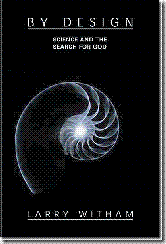On a discussion forum, a poster recently wrote (in part):
If you choose to disregard the first two chapters of the bible in Genesis that specifically state that God rested the 7th day of creation and want to interpret it in a way that you see fit by your own reasoning that is your choice.
I cannot in good conscience - in full assurance of God's grace and acknowledgement of His Sovereignty in creation - forgo His stated word in scripture against the claims" of science. We either are or are not his created beings... sorta kinda maybe doesnt work for me.'
People who criticise those who wish to read Genesis 1 and 2 as symbolic/metaphorical constantly imply that they are rejecting what Scripture says.
This is an incorrect assertion. Those who wish to read Genesis in this manner are not suggesting that we disregard the first two chapters of the bible -- the point is that we need to interpret it correctly. These interpreters
may be wrong about their interpretation -- but it is important to recognise that they are just as concerned to respond to the authority of Scripture as the literal readers are. (In any case, to describe people as literal or metaphorical interpreters is too simplistic).
Augustine once pitted the claims of science that there were humans living in the Antipodes against Scripture. He said it was absurd and impossible that this was so because Scripture didn't teach it. Science proved his interpretation of Scripture wrong. Scripture didn't teach what he thought it did. There was nothing wrong with science in this case. There was nothing wrong with Scripture, either. The problem was Augustine and his interpretation.
Too many people only see two components in the alleged warfare between science and Scripture:
Scripture ---------------- Science
They argue that if science says something and Scripture says something different, then Scripture must be right and Science wrong. The problem is that there is a third component that many are unwilling to consider -- the interpreter:
Science -------------- Interpreter --------------Scripture
The issue is not whether Scripture is right about science or not. And it is not about whether science is right about Scripture or not. Scripture and Science are concerned with different issues. The question is whether the
interpreter is right about science and Scripture.
Science deals primarily in observations of empirical data
which must be interpreted to arrive at conclusions -- it's a tentative, dynamic, ever-improving process of understanding. Scripture deals with ultimate concerns and
must be interpreted for Christians to come to conclusions. It, too, is a tentative, dynamic, ever-improving process of inquiry. There are two possible issues to consider:
- The scientist may interpret the empirical data incorrectly.
- The Bible student may interpret the biblical data incorrectly.
Far too many Christians assume that their
interpretation of Scripture is correct and if any scientific statement disagrees with their
interpretation of Scripture then science must be wrong.
There are two potential problems that need to be corrected:
- A naive understanding of science.
- A naive understanding of Scripture.
Both of these problems reside in the
interpreter. Here's my approach:
I am not a scientist so am unqualified to pass judgment on many scientific findings. Despite the fact that I may understand some aspects of science, I have to admit to not being expert enough to follow some of the complicated reasoning around scientific theories of origin. I have made it my business, however, to study the nature of science (the philosophy of science). In fact, a significant part of my responsibilities as a supervisor of higher degree students is to understand the nature of scientific inquiry. In my view, many of the statements about science made by many, many Christians show a complete lack of understanding about what science
actually is and how it
actually works.
As a Christian, I have been studying the Bible all my life and, as part of that process, have studied the process of biblical interpretation (hermeneutics) and so, in comparison, know much more about the Bible than I do about science (I'd like to know a whole lot more!).
Scientists need to make sure that they get their side of the story right.
Christians need to make sure that they get their side of the story right.
Scientists may be wrong in their conclusions.
Christians may be wrong in their conclusions.
OUR job as Christians is to get our conclusions about Scripture correct.
Some Christians need to stop suggesting that, because a fellow Christian says (or implies) that Christians need to make sure our interpretation of Genesis is correct it means they are denying the reliability of Scripture.
The implication that interpreting Genesis in any other way than a literalistic, scientific, historical account of origins (in the way 21st century people understand science and history) is somehow being untrue to Scripture is a false implication.
In all biblical interpretation, what is important to consider is:
- the original authorial intent - the purpose of the text.
- the original historical and cultural context -- understanding the text as the original readers would have.
- the genre of the text (poetry? history? narrative? etc?)
Open up at least three commentaries (preferably from different perspectives) and have a look at the sections on authorship, genre, culture, and history of Genesis. Discover that these questions are not as simple as we sometimes try to make them appear to be!
Genesis 1-3 contains incredible truth such as (adapted from Waltke):
- God is the reason and power behind the whole mysterious universe.
- Human society is in a mess because people have left God out of their reckoning.
- God is patient and forgiving, but God is also Judge of all disobedience.
- Fallible human beings can be used to achieve God's purposes.
- Faith means trusting God alone and following God even when doing so seems crazy.
You don't need to read Genesis as science to believe these important truths.
